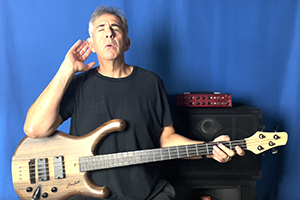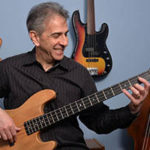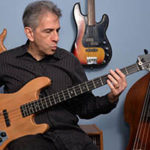What to listen for as a bass player
By Jon Liebman
Week of July 19, 2021
At this stage in your life, you’re probably not trying to set the world on fire by becoming a rock star. I’m guessing you just want to learn to play bass, lay down some feel-good grooves and have some fun (if I’m wrong, let me know).
Regardless of anyone’s current level – or whatever level to which one aspires – there are certain things that are important to musicians in general, and bass players in particular.
Most notably, it’s how we use our ears, and how our playing is directly affected by what we hear.
I had a fabulous conversation recently with virtuoso doubler George Farmer, published as this week’s FBPO interview, in which the subject came up. George, who grew up in Vienna, Austria, was exposed to music from an early age. The son of legendary jazz trumpeter Art Farmer, you can say George has had music in his blood right from the start.
What I found most impressive about George was the way he talked about instantly sizing up everything he hears in music, as if it’s a given that certain things should immediately be apparent when a musician, professional or otherwise, hears them.
“I think where the professional musician differs from the amateur musician,” George says, “is the use of their ears and the ability to identify musical content after hearing it one time. That’s really the difficulty.”
Don’t let those words scare you away. In fact, as we continued the conversation, I actually found George’s comments to be quite encouraging for anyone who wants to learn bass. No one says you have to be an expert on day one. There’s always another level of skill to cultivate, regardless of whether you’re a beginner or a virtuoso.
“Young students, or older students,” George says, “it really doesn’t matter where you are in your lifespan as a musician. One thing that we constantly need to do is check our ears and make sure that we are able to identify chords at a moment’s notice, identify the sound of scales, identify melodies, all of that.”
If you’re not there yet, that’s okay. What’s important is to understand those goals when learning bass, so you can strive to make incremental progress. For perspective, George breaks down the components of music, with a reminder to bass players of how we provide the thread that gets woven throughout them all.
“There are only three ingredients,” he says. “Rhythm, melody, harmony. That’s it. There’s nothing else. The bass puts all of that together.”
It sounds like a lot to take on for someone who’s learning bass. And, well, I suppose it is. Keep in mind, though, there are steps to follow when learning bass, and if you follow the right path, you’ll end up having more fun than you can ever describe.
As you continue on your quest to learn bass, remember to listen intently to everything going on around you, regardless of your skill level. You won’t get everything right away, but you’ll gain a greater understanding of how the bass functions within the band, with a deeper grasp of important musical concepts, all of which will make you a better bass player.
“So, ear training, identifying chords becomes a necessity,” says George, summing it up, “and the quicker you are able to identify certain notes, chords, melodies, the better it is.”
How about you? Do you have a thought on the subject? Leave a comment below and let me know what you think. In the meantime, check out my interview with George here.




